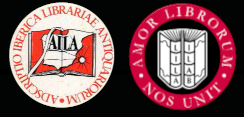


Home |
Temáticas |
Catálogos |
Pedidos |
  |  |
|||||||
|

|
RUGENDAS. (Johann Moritz) HABITANTE DE GOYAS, QUADRO A ÓLEO PINTADO SOBRE MADEIRA. |
|
|
Clique nas imagens para aumentar. FREIRE DOS REIS. (Pascoal José de Melo) HISTORIAE JURIS CIVILIS LUSITANI LIBER SINGULARIS.PASCHALIS JOSEPHI MELLII FREIRII, Acad. Regiæ Scient. Olisip. Socii, In Regio Ordinum Militarium Collegio Collegæ, & Publici apud Conimbricensem Academiam Juris Patrii Professoris ORD. HISTORIÆ JURIS CIVILIS LUSITANI LIBER SINGULARIS Jussu Acad. Regiæ Scient. in Lucem Editus. ACCEDUNT De Jure-Consultis Lusitanis, &; recta Patrii Juris interpetrandi ratione CAPITA DUO. OLISIPONE Ex Typographia Regalis Academiæ Scientiarum Olisiponensis. Anno CIↃ. IↃCC. LXXXVIII. [1788]. Permissu Regiæ Curiæ Commissionis Generalis pro Examine, & Censura Librorum. De 19,5x14 cm. Com [xxx], 221, [iv] págs. Encadernação da época inteira de pele, com rótulo e ferros a ouro na lombada. Impressão muito nítida em caracteres de vários tamanhos, maioritariamente redondos, mas também com alguns itálicos, nomeadamente no prefácio e subtítulos. Tem uma inicial decorada e um pequeno cabeção com motivos tipográficos na primeira página numerada. Erro de paginação constando 121 ao invés de 221. Exemplar com o rótulo desvanecido falhas superficiais de pele na lombada e na pasta posterior. Assinatura de posse coeva na folha de rosto. As últimas páginas não numeradas apresentam erratas. Primeira edição. A segunda e terceira edições foram impressas em 1794 e 1800, também pela tipografia da Academia Real das Ciências [Ex Typographia Regalis Academiae Scientiarum Olisiponensis]. Este compêndio histórico, primeiro em Portugal no seu género, segue um método inspirado em Heinécio (1681-1741), através do qual se pretendia oferecer ao leitor uma exposição sistemática, doutrinária, documentada e racional das matérias. Ao longo de treze capítulos, o autor descreve principalmente a história externa do nosso direito desde os tempos pré-romanos (caps. I-XI), depois do que se refere aos anteriores juristas portugueses (cap. XII) e aos métodos de interpretação do direito pátrio (cap. XIII). Juntam-se a estes os seguintes anexos: I - Cópia do primeiro parágrafo do Livro I das Ordenações do Senhor Rei D. Afonso V; II - Índice dos títulos que contêm os cinco livros manuscritos das ditas Ordenações; III - Tabela comparativa dos títulos concordantes nas Ordenações Filipinas, Manuelinas e Afonsinas. Sobreviveu como leitura pedagógica essencial até 1841, ano em que Coelho da Rocha publicou o Ensaio sobre o Governo e a Legislação de Portugal, procedendo à sua revisão e atualização. A leitura desta obra tornou-se indissociável da apreciação do parecer polémico do censor António Pereira de Figueiredo. Pascoal José de Melo Freire dos Reis (Ansião, 1738 – Lisboa, 1798), considerado um dos mais eminentes jurisconsultos portugueses da segunda metade do século XVIII, é frequentemente tido na bibliografia histórico-jurídica como o fundador da moderna história do direito português. Foi aluno e professor da Universidade de Coimbra, onde desde muito cedo se distinguiu como lente substituto da recém-criada cadeira de Direito Pátrio (1772), com privilégios equiparados a regente, durante a reforma Pombalina da mesma Universidade. Acumulou, além das atividades docentes e académicas, outros cargos e algumas sinecuras de prestígio: foi deputado da Junta da Bula de Cruzada e da Assembleia da Ordem de Malta (1783), provisor do Grão-Priorado do Crato e deputado da sua Mesa Prioral (1785), desembargador de agravos da Casa da Suplicação (1785), deputado da Casa do Infantado (1786), da Mesa da Comissão Geral sobre o Exame e Censura dos Livros (1787) e do Conselho Geral do Santo Ofício (1793); recebeu ainda a mercê de conselheiro régio (1793) e as conezias doutorais das sés da Guarda, de Faro e de Braga. Quanto à sua atividade literária, Pascoal de Melo idealizou e concretizou aquela que foi a sua maior contribuição para a literatura histórico-jurídica em resposta às novas exigências estatutárias do ensino do direito na Universidade, especialmente as que determinavam a elaboração de compêndios didáticos. Sistematizou pela primeira vez uma história do direito público português, que sai do prelo com o título Historiae Juris Civilis Lusitani (1788); e condensou todo o sistema do direito vigorante com as Institutiones Juris Civilis Lusitani, cum Publici tum Privati (4 tomos, 1789-1793) e as Institutionum Juris Criminalis Lusitani (1794), que constitui o livro quinto autonomizado do conjunto anterior. Estes seis volumes, últimos do género em língua latina, foram editados pela Academia das Ciências e depois pela Universidade, acabando por ser adotados, em 1805, como manuais para as cadeiras de Direito Pátrio e de História dos Direitos Romano e Pátrio. Pascoal de Melo ocupa um lugar importante no conjunto dos eruditos portugueses que integraram uma cultura histórico-jurídica em transmutação nos finais do Antigo Regime.
Very clear printing in various font sizes, mostly round, but also with some italics, particularly in the preface and subtitles. It has a decorated initial and a small headpiece with typographic motifs on the first numbered page. Paging error with 121 instead of 221. Copy with faded label, superficial leather flaws on spine and rear board. Coeval handwritten ownership title on title page. The last unnumbered pages contain errata. First edition. The second and third editions were printed in 1794 and 1800, also by the Academia Real das Ciências [Ex Typographia Regalis Academiae Scientiarum Olisiponensis]. This historical compendium, the first of its kind in Portugal, follows a method inspired by Heineccius (1681-1741), through which it was intended to offer the reader a systematic, doctrinal, documented and rational exposition of the subjects. Over the course of thirteen chapters, the author mainly describes the external history of our law since pre-Roman times (chaps. I-XI), after which he refers to earlier Portuguese jurists (chap. XII) and the methods of interpreting Portuguese law (chap. XIII). The following appendices are attached: I - Cópia do primeiro parágrafo do Livro I das Ordenações do Senhor Rei D. Afonso V (Copy of the first paragraph of Book I of the Ordinances of King Afonso V); II - Índice dos títulos que contêm os cinco livros manuscritos das ditas Ordenações (An index of the titles contained in the five handwritten books of the said Ordinances); III - Tabela comparativa dos títulos concordantes nas Ordenações Filipinas, Manuelinas e Afonsinas (Comparative table of the concordant titles in the Philippine, Manueline and Afonsine Ordinances). It survived as essential educational reading until 1841, when Coelho da Rocha published his Ensaio sobre o Governo e a Legislação de Portugal (Essay on the Government and Legislation of Portugal), revising and updating it. Reading this work became inseparable from analysing the controversial opinion of censor António Pereira de Figueiredo. Pascoal José de Melo Freire dos Reis (Ansião, 1738 - Lisbon, 1798), considered one of the most eminent Portuguese jurisconsults of the second half of the 18th century, is often regarded in historical and legal bibliography as the founder of the modern history of Portuguese law. He was a student and professor at the University of Coimbra, where he distinguished himself from an early age as a substitute lecturer in the newly created chair of National Law (1772), with privileges equated to regent, during the Pombaline reform of the same university. In addition to his teaching and academic activities, he also held other prestigious posts and positions: he was a deputy of the Board of the Crusade Bull and of the Assembly of the Order of Malta (1783), provisor of the Grand Priory of Crato and deputy of its Priory Board (1785), judge of aggravations of the House of Appeal (1785), deputy of the House of the Infantado (1786), of the Board of the General Commission on the Examination and Censorship of Books (1787) and of the General Council of the Holy Office (1793); He was also honoured as a royal councillor (1793) and received doctoral degrees from the cathedrals of Guarda, Faro and Braga. With regard to his literary activity, Pascoal de Melo devised and realised what was his greatest contribution to historical and legal literature in response to the new statutory requirements for the teaching of law at the University, especially those that determined the production of didactic compendiums. He systematised for the first time a history of Portuguese public law, which came out of print under the title Historiae Juris Civilis Lusitani (1788); and condensed the entire system of law in force with the Institutiones Juris Civilis Lusitani, cum Publici tum Privati (4 volumes, 1789-1793) and the Institutionum Juris Criminalis Lusitani (1794), which is the fifth independent book of the previous set. These six volumes, the last of their kind in the Latin language, were published by the Academy of Sciences and then by the University, and were eventually adopted in 1805 as textbooks for the subjects of National Law and the History of Roman and National Law. Pascoal de Melo occupies an important place in the group of Portuguese scholars who were part of a historical-legal culture in transmutation at the end of the Ancien Régime. Referências/References: Referência: 2401SB010
Local: M-10-D-68 Caixa de sugestões A sua opinião é importante para nós. Se encontrou um preço incorrecto, um erro ou um problema técnico nesta página, por favor avise-nos. 
|
Pesquisa Simples




|
||
 |
|||
|